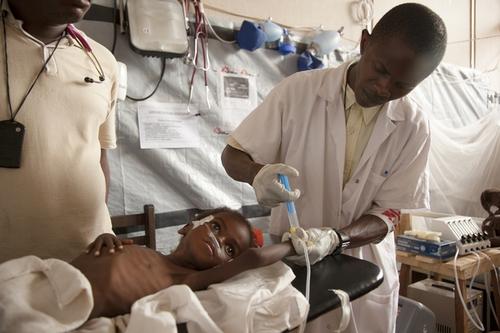The Democratic Republic of Congo (DRC) has been in the grip of a measles epidemic since 2010. Throughout the country, Médecins Sans Frontières (MSF) teams are carrying out vaccination campaigns for children between the ages of six months and 15 years, and treating people with the illness. Today, the medical humanitarian aid organisation calls for better routine vaccination and catch-up campaigns to put an end to the epidemic. It calls on health actors to maintain levels of vaccination coverage in the country sufficient to limit the number of deaths that occur from this preventable illness.
4,500 deaths since 2010
Since the epidemic began in 2010, more than 4,500 people in DRC – principally children under the age of five – have died from the illness. According to a retrospective mortality survey carried out by the MSF epidemiological research centre Epicentre in Aketi, Bas-Uélé, Province Orientale, 35 percent of children under five had fallen ill with measles between December 2012 and October 2013; and of those children, seven percent died. MSF treated some 11,780 people in the area.
More financial resources needed
Measles can be fatal in children when left untreated, though the illness can be guarded against with a vaccine. But routine vaccination campaigns have not had sufficient reach to put an end to epidemics, and catch-up campaigns are insufficient. "Even though certain efforts were made in 2013 to increase the quality of vaccination campaigns, this is far from satisfactory and there are still many shortcomings. More financial resources must be deployed to vaccinate more year-round, in catch-up as well as in routine vaccination campaigns," explains Dr Kyroussis, MSF medical coordinator.
Catch-up campaigns
“All newborns should be vaccinated in their first year; but they must also receive a second dose of the vaccine, without which they may not be completely protected from the disease. At the moment, in DRC, that can only be done through catch-up campaigns, so it’s necessary to organise regular vaccination campaigns as laid out in the country's measles elimination strategy. It's vital,” affirms Dr Kyrousis.
Quality also a key factor
The quality of vaccination campaigns is also a key factor in ensuring that children are vaccinated effectively. Campaigns must be carried out with the appropriate logistical capacities (the cold chain necessary to keep vaccines at the right temperature) Vaccination activities must be planned appropriately, respecting the specific nature of each health zone (for example, sufficient time is allowed for in accordance with the size and the complexity of the area).
To face the measles epidemic that has been raging in the country since 2010, MSF vaccinates people in each of DRC’s 11 provinces. In 2013, the organisation vaccinated more than 1,100,000 children from six months to 15 years of age. MSF teams treated nearly 30,000 patients suffering from the disease – mostly children, but some adults as well. MSF is working primarily in the areas where epidemics have been reported, but has also carried out preventative vaccination campaigns among people who have been displaced.



